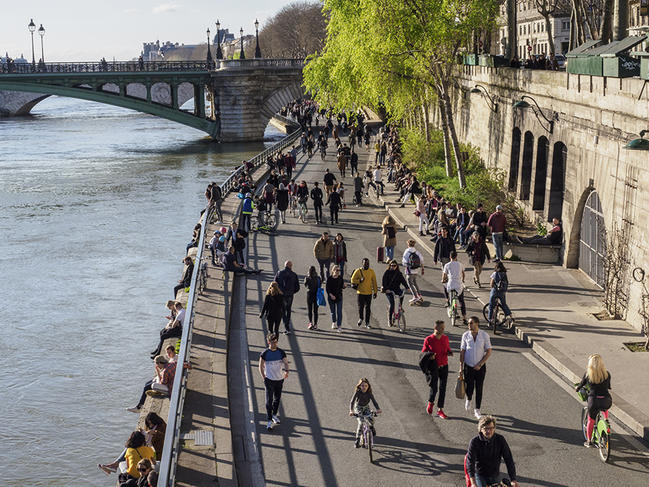Global S&T Development Trend Analysis Platform of Resources and Environment
| The Covid-19 Epidemic Highlights the Need to Think of Others | |
| admin | |
| 2020-04-15 | |
| 发布年 | 2020 |
| 语种 | 英语 |
| 国家 | 法国 |
| 领域 | 地球科学 |
| 正文(英文) |

At 8:00pm every evening, French people come to their windows to applaud the country’s healthcare workers.
An interview with Grégoire Borst, director of the Laboratory for the Psychology of Child Development and Education (LaPsyDÉ) on how cognitive bias influences people’s behaviour – both in everyday life and during the coronavirus crisis.
You are a specialist in the cognitive neurosciences in education, with a particular interest in the thought mechanisms that sometimes lead people, children and adults alike, to make wrong decisions. Can you tell us more? This also applies to learning situations. Through the exercises that they are given, primary school children learn very early on that the word ‘plus’ is synonymous with addition. Yet, it is not always so – and when an exercise becomes more complex, they might have the wrong reflex. Suppose they have to solve the following problem: ‘Pierre has 15 marbles. He has as many as Paul, plus 5. How many marbles does Paul have?’ Most children in the eight to nine age group will say 20, because they hear the word ‘plus’ and add the two figures together, even though the answer is 10. They must be made aware of these mental reflexes in order to inhibit them when necessary. And the same mechanisms are at work in adults as well. How does cognitive bias apply to the coronavirus crisis? This is exactly what is happening with confinement: people expect others to confine themselves and don’t see it as a matter of personal responsibility. Today, it’s time to start thinking of those around us, rather than ourselves, because each of our actions has societal consequences, and vice versa. However, it is difficult to think collectively, all the more so in a society with a heightened sense of individual responsibility that short-circuits the governmental narrative. We are constantly being told that we are in control of our health through our lifestyle choices, and that our professional and personal fulfilment depends on our own decisions as well. It is even more difficult when messages from the public authorities are confusing. Are you saying that the governement’s directives in this crisis have not been clear enough? All this creates what in psychology is called cognitive dissonance, an extremely uncomfortable situation for the human mind, which will try to alleviate it by a process of rationalisation. In the case of the Sunday voting, this led to the following reasoning: confinement is necessary to limit the spread of the virus, but I am told that I can go to vote in complete safety. Therefore I am not taking any risk, and I am not putting others in danger if I go for a walk… 
How do you think these messages could be improved? Similarly, rather than just announcing the number of deaths, it would have had greater impact to also disclose the Covid-19 mortality rates by age group instead of the mere overall figure of 2%, which can seem low at first glance. Giving them all these details would make people more receptive, and would be the best way to raise their awareness as to the real risk. Fortunately, it looks like the French are beginning to modify their attitudes, because they are better informed and have a clearer perspective on the crisis endured by other countries like Italy. What do you think of the authorities’ narrative on the need to ‘flatten the curve’ of the epidemic? Is it sufficiently explicit for the general public? For example, the ‘5 A Day’ campaign to encourage people to eat five portions of fruit and vegetables every day clearly had a limited effect, whereas the Nutri-score system2 could potentially have a lasting influence on consumers’ behaviours. The same problem arises concerning immunisation coverage, where compulsory vaccination has not had the desired results. It is necessary to appeal to individual intelligence. A general public health message needs to be clear, but not simplistic. And above all, it must not be dissonant. Your laboratory has initiated a collaboration with the survey company Ipsos. What can you tell us about that? What’s important now is to see how we can contribute to the understanding of individuals’ perceptions of the pandemic based on the concepts we develop in the laboratory, and which can be used by Ipsos in their studies. Go further
0 comment
|
| URL | 查看原文 |
| 来源平台 | Centre national de la recherche scientifique |
| 文献类型 | 新闻 |
| 条目标识符 | http://119.78.100.173/C666/handle/2XK7JSWQ/232388 |
| 专题 | 地球科学 |
| 推荐引用方式 GB/T 7714 | admin. The Covid-19 Epidemic Highlights the Need to Think of Others. 2020. |
| 条目包含的文件 | 条目无相关文件。 | |||||
| 个性服务 |
| 推荐该条目 |
| 保存到收藏夹 |
| 查看访问统计 |
| 导出为Endnote文件 |
| 谷歌学术 |
| 谷歌学术中相似的文章 |
| [admin]的文章 |
| 百度学术 |
| 百度学术中相似的文章 |
| [admin]的文章 |
| 必应学术 |
| 必应学术中相似的文章 |
| [admin]的文章 |
| 相关权益政策 |
| 暂无数据 |
| 收藏/分享 |
除非特别说明,本系统中所有内容都受版权保护,并保留所有权利。